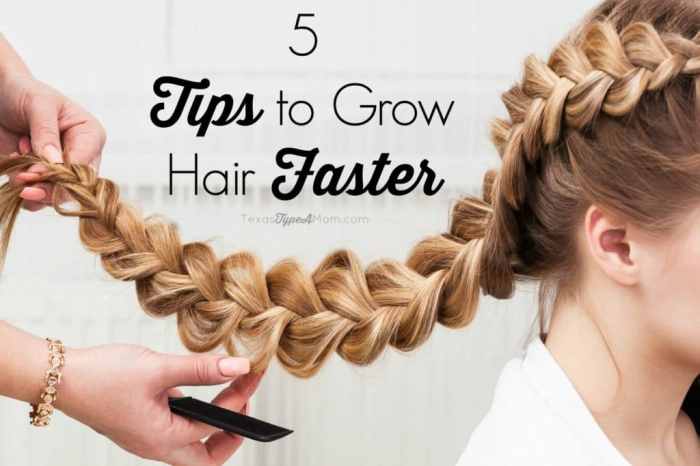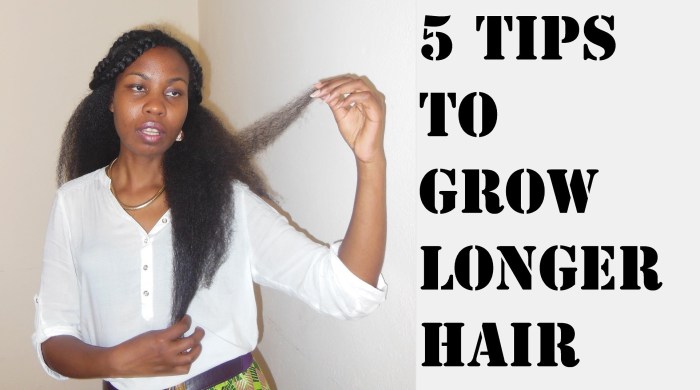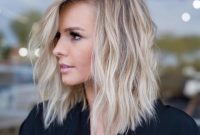Hair growth is a complex process that involves various factors, including genetics, nutrition, and lifestyle habits. While some factors are beyond our control, there are several things we can do to promote healthy hair growth and achieve our desired hair length.
This comprehensive guide will provide you with essential information on hair care, covering topics such as dietary factors, scalp care, hair care practices, lifestyle habits, medical considerations, natural remedies, professional treatments, and product recommendations. By understanding these aspects, you can develop a personalized hair care routine that nourishes your hair and supports its growth.
Hair Growth Overview

Hair growth is a complex process that involves the interaction of various factors. Understanding the basics of hair growth and its phases can help you take better care of your hair and promote its healthy growth.
Hair growth occurs in three distinct phases: the anagen phase, the catagen phase, and the telogen phase. The anagen phase is the active growth phase, during which the hair follicle produces a new hair shaft. The catagen phase is a transitional phase, during which the hair follicle shrinks and detaches from the hair shaft.
The telogen phase is the resting phase, during which the hair follicle remains dormant.
Factors Influencing Hair Growth
Several factors can influence hair growth, including:
- Genetics: The genes you inherit from your parents play a significant role in determining your hair growth rate, texture, and color.
- Hormones: Hormones, such as testosterone and estrogen, can affect hair growth. For example, high levels of testosterone can lead to increased hair growth, while low levels of estrogen can lead to hair loss.
- Diet: A healthy diet that provides your body with the necessary nutrients is essential for healthy hair growth. Nutrients such as protein, iron, and biotin are particularly important for hair growth.
- Stress: Stress can lead to hair loss. This is because stress can cause the release of hormones that can damage hair follicles.
- Medical conditions: Certain medical conditions, such as thyroid problems and autoimmune diseases, can lead to hair loss.
Dietary Factors
Adequate nutrition plays a vital role in supporting healthy hair growth. A balanced diet rich in essential nutrients is crucial for maintaining the health and integrity of hair follicles and promoting hair growth.
Key nutrients for hair growth include:
- Protein: Hair is primarily composed of a protein called keratin, making protein essential for hair growth. Adequate protein intake is necessary for the production of keratin and the maintenance of healthy hair structure.
- Biotin: Biotin, also known as vitamin B7, is a crucial nutrient for hair growth. It helps strengthen hair follicles and prevents hair breakage.
- Iron: Iron deficiency can lead to anemia, which can cause hair loss. Iron is essential for the production of red blood cells, which carry oxygen to the hair follicles.
- Zinc: Zinc is involved in various hair growth processes, including protein synthesis and cell division. Zinc deficiency can lead to hair loss and impaired hair growth.
- Vitamin C: Vitamin C is an antioxidant that helps protect hair follicles from damage caused by free radicals. It also supports collagen production, which is important for hair growth.
- Vitamin D: Vitamin D deficiency has been linked to hair loss. Vitamin D is involved in hair follicle cycling and can help promote hair growth.
Maintaining a balanced diet that provides these essential nutrients is crucial for optimal hair growth. Additionally, adequate hydration is vital for overall health, including hair growth. Drinking plenty of water helps keep hair follicles hydrated and supports healthy hair growth.
Scalp Care
Maintaining a healthy scalp is crucial for promoting hair growth and overall hair health. A healthy scalp provides an optimal environment for hair follicles to thrive and produce strong, healthy hair.
To maintain a healthy scalp, it’s essential to adopt a proper scalp care routine that includes regular cleansing, exfoliation, and moisturizing.
Cleansing
- Regularly cleanse your scalp with a gentle shampoo that is suitable for your hair type. Avoid harsh shampoos that can strip your scalp of its natural oils.
- When shampooing, focus on cleansing the scalp rather than the hair. Use your fingertips to gently massage the shampoo into the scalp, creating a lather.
- Rinse the shampoo thoroughly with lukewarm water to remove any residue.
Exfoliating
Exfoliating the scalp helps remove dead skin cells, product buildup, and excess oil, allowing for better penetration of hair care products.
- Use a scalp scrub or exfoliating shampoo once or twice a week.
- Gently massage the exfoliating product into the scalp in circular motions.
- Rinse thoroughly with lukewarm water.
Moisturizing
Moisturizing the scalp helps keep it hydrated and prevents dryness, which can lead to scalp irritation and hair damage.
- Apply a scalp moisturizer or hair oil to your scalp after cleansing.
- Massage the moisturizer into the scalp using your fingertips.
- Leave the moisturizer on for as long as directed by the product instructions.
4. Hair Care Practices

Maintaining healthy hair requires proper hair care practices that promote growth and prevent damage. This includes brushing techniques, selecting the right hair products, and minimizing heat styling.
Proper Brushing Techniques
Brushing hair gently removes tangles and distributes natural oils, promoting hair growth. Use a brush with soft bristles and start brushing from the ends, gradually working your way up to the roots. Avoid over-brushing, as it can cause breakage.
Using Hair Products
Shampoo: Use a shampoo that suits your hair type and scalp condition. Wash your hair as often as necessary, but avoid over-washing, which can strip away natural oils. Conditioner: Conditioner replenishes moisture and helps detangle hair.
Apply it to the mid-lengths and ends of your hair, avoiding the roots. Masks: Hair masks provide deep conditioning and nourishment. Use them once or twice a week to improve hair health and promote growth.
Heat Protectants and Minimizing Heat Styling
Heat styling tools, such as blow dryers and flat irons, can damage hair. Use heat protectant sprays to minimize heat damage. Additionally, limit heat styling and allow your hair to air dry whenever possible.
Lifestyle Habits
Lifestyle choices significantly impact hair growth. Understanding and addressing these factors can enhance your hair’s health and promote optimal growth.
Several lifestyle habits influence hair growth, including stress, sleep patterns, and exercise. Managing these factors effectively can contribute to healthier hair and support its growth.
Stress Management
Chronic stress can disrupt the hair growth cycle, leading to hair loss or slower growth. Effective stress management techniques can help mitigate its impact on hair health.
- Identify and address the sources of stress in your life.
- Engage in relaxation techniques such as yoga, meditation, or deep breathing exercises.
- Seek professional help from a therapist or counselor if needed.
Sleep Patterns
Adequate sleep is crucial for overall health, including hair growth. Aim for 7-9 hours of quality sleep each night to support healthy hair growth.
- Establish a regular sleep schedule and stick to it as much as possible.
- Create a relaxing bedtime routine that promotes sleep.
- Avoid caffeine and alcohol before bed, as they can interfere with sleep.
Exercise
Regular exercise promotes blood circulation, which can benefit hair growth. Aim for at least 30 minutes of moderate-intensity exercise most days of the week.
- Choose activities you enjoy to make exercise more sustainable.
- Listen to your body and rest when needed.
- Stay hydrated by drinking plenty of water before, during, and after exercise.
Medical Considerations
Hair growth can be affected by various medical conditions. Understanding these conditions and their impact on hair health is crucial for proper management.
Hormonal imbalances, such as those caused by thyroid disorders or polycystic ovary syndrome (PCOS), can disrupt the normal hair growth cycle, leading to hair loss or thinning.
Genetics
Genetics play a significant role in hair health. Certain genetic traits, such as hair texture, color, and growth rate, are inherited. Genetic factors can also influence susceptibility to hair loss conditions like male-pattern baldness and female-pattern hair loss.
7. Natural Remedies

Harnessing nature’s bounty, natural remedies offer potential benefits for hair growth. These ingredients have been traditionally used to promote scalp health and hair vitality.
Incorporating natural remedies into a hair care routine can be achieved through various methods, such as:
- Adding essential oils to shampoos or conditioners
- Applying hair masks or rinses
- Consuming herbal teas or supplements
Table of Natural Ingredients for Hair Growth
| Ingredient | Purported Benefits |
|---|---|
| Aloe vera | Soothes scalp irritation, reduces inflammation, and promotes hair growth |
| Rosemary oil | Stimulates hair follicles, improves blood circulation, and reduces hair loss |
| Green tea | Rich in antioxidants, protects hair from damage, and promotes growth |
| Coconut oil | Moisturizes and nourishes hair, prevents breakage, and promotes shine |
| Onion juice | Contains sulfur, which supports hair growth and reduces hair fall |
Professional Treatments
Professional hair treatments offer advanced solutions for promoting hair growth and addressing scalp issues. These treatments are performed by licensed professionals and can be tailored to individual needs.Various types of professional hair treatments are available, including:
Laser Therapy
Laser therapy involves the use of low-level lasers to stimulate hair follicles and promote hair growth. It is thought to improve blood circulation, reduce inflammation, and increase the production of growth factors. Laser therapy is generally safe and well-tolerated, with minimal side effects.
Microneedling
Microneedling involves using tiny needles to create micro-injuries in the scalp. This triggers the body’s natural healing response, leading to increased collagen production and the release of growth factors. Microneedling can be effective in treating hair loss caused by alopecia areata and other conditions.
It is important to note that microneedling can cause some discomfort and temporary redness.
Platelet-Rich Plasma (PRP) Therapy
PRP therapy involves injecting concentrated platelets from the patient’s own blood into the scalp. Platelets contain growth factors that can stimulate hair growth and improve scalp health. PRP therapy is a relatively new treatment, and its long-term effectiveness is still being studied.
Scalp Injections
Scalp injections involve injecting medications or growth factors directly into the scalp. This method can deliver targeted treatment to specific areas and is often used in combination with other hair loss treatments. Scalp injections can be effective in treating conditions such as alopecia areata and androgenetic alopecia.It
is important to consult with a qualified hair loss specialist before undergoing any professional hair treatment. The specialist can assess the underlying cause of hair loss and recommend the most appropriate treatment option.
Product Recommendations
Choosing the right hair care products is crucial for achieving optimal hair growth. Here’s a comprehensive guide to recommended products based on specific hair types and needs:
For Dry Hair
* SheaMoisture Manuka Honey & Mafura Oil Intensive Hydration Shampoo and Conditioner: Infused with nourishing shea butter, honey, and mafura oil, this duo deeply hydrates and replenishes moisture levels, leaving hair soft and manageable.
Olaplex No. 3 Hair Perfector
This at-home treatment repairs damaged bonds within the hair shaft, strengthening and restoring its elasticity. It’s ideal for hair that’s prone to breakage or dryness.
For Oily Hair
* Briogeo Scalp Revival Charcoal + Biotin Dry Shampoo: This dry shampoo effectively absorbs excess oil, leaving hair looking fresh and clean without weighing it down. Its activated charcoal purifies the scalp, while biotin promotes hair growth.
Kristin Ess Clarifying Shampoo
Formulated with apple cider vinegar, this shampoo removes product buildup and clarifies the scalp, reducing oiliness and leaving hair feeling refreshed.
For Damaged Hair
* Kérastase Resistance Extentioniste Shampoo and Conditioner: This system is designed to repair and strengthen damaged hair from the roots to the ends. It contains creatine and ceramides, which work together to reinforce the hair structure and prevent breakage.
Redken Extreme Anti-Snap Leave-In Treatment
This leave-in treatment protects hair from heat damage and environmental stressors. It contains a blend of amino acids and ceramides that help to repair and strengthen the hair shaft, reducing breakage and split ends.
For Color-Treated Hair
* Davines Alchemic Shampoo and Conditioner: This color-safe shampoo and conditioner gently cleanses and conditions while enhancing the vibrancy of color-treated hair. It contains a blend of natural extracts that protect hair from fading and brassiness.
Olaplex No. 4 Bond Maintenance Shampoo
This color-safe shampoo repairs and strengthens damaged bonds within the hair shaft, preventing color loss and fading. It’s ideal for maintaining the health and vibrancy of color-treated hair.
Summary
Growing healthy hair requires a holistic approach that encompasses proper nutrition, scalp care, hair care practices, and lifestyle habits. By incorporating the tips and recommendations Artikeld in this guide, you can create an effective hair care regimen that promotes hair growth and enhances its overall health and appearance.
FAQ Section
What is the average hair growth rate?
The average hair growth rate is approximately 0.5 inches per month.
How often should I wash my hair?
The frequency of hair washing depends on individual hair type and scalp condition. Generally, washing your hair every 2-3 days is recommended.
Is it true that cutting hair makes it grow faster?
Cutting hair does not directly affect the rate of hair growth. However, regular trims can remove split ends, preventing breakage and creating the illusion of healthier, fuller hair.



